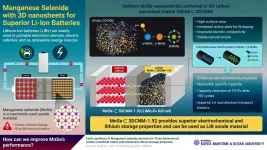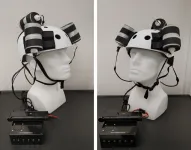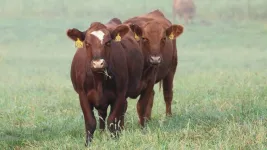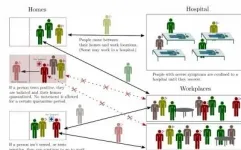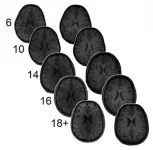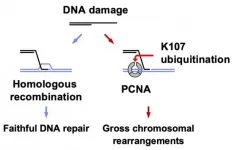(Press-News.org) Lithium-ion batteries (LIBs), which are a renewable source of energy for electrical devices or electric vehicles, have attracted much attention as the next-generation energy solution. However, the anodes of LIBs in use today have multiple inadequacies, ranging from low ionic electronic conductivity and structural changes during the charge/discharge cycle to low specific capacity, which limits the battery's performance.
In search of a better anode material, Dr. Jun Kang of Korea Maritime and Ocean University, along with his colleagues from Pusan National University, Republic of Korea, END
'Wrapping' anodes in 3D carbon nanosheets: The next big thing in li-ion battery technology
Study finds that anchoring manganese selenide nanoparticles, an anode material, in 3D carbon nanosheets prevents their expansion in lithium-ion batteries
2021-07-22
ELSE PRESS RELEASES FROM THIS DATE:
During COVID-19, nurses face significant burnout risks, reports American Journal of Nursing
2021-07-22
July 22, 2021 - Early in the COVID-19 pandemic, more than 40 percent of nurses and other health care workers had risks associated with an increased likelihood of burnout, reports a survey study in the August issue of the American Journal of Nursing (AJN). The journal is published in the Lippincott portfolio by Wolters Kluwer.
The study identifies risk factors for poor well-being as well as factors associated with greater resilience - which may reduce the risk of burnout for hands-on care providers, according to the new research by Lindsay Thompson Munn, RN, PhD, and colleagues of a North Carolina healthcare system. They write, "The insights ...
Surrey builds AI to find anti-ageing chemical compounds
2021-07-22
The University of Surrey has built an artificial intelligence (AI) model that identifies chemical compounds that promote healthy ageing - paving the way towards pharmaceutical innovations that extend a person's lifespan.
In a paper published by Nature Communication's Scientific Reports, a team of chemists from Surrey built a machine learning model based on the information from the DrugAge database to predict whether a compound can extend the life of Caenorhabditis elegans - a translucent worm that shares a similar metabolism to humans. The worm's shorter lifespan gave the researchers the opportunity to see the impact of the chemical compounds.
The AI singled ...
Investigational magnetic device shrinks glioblastoma in first-in-world human test
2021-07-22
Houston Methodist Neurological Institute researchers from the department of neurosurgery shrunk a deadly glioblastoma tumor by more than a third using a helmet generating a noninvasive oscillating magnetic field that the patient wore on his head while administering the therapy in his own home. The 53-year-old patient died from an unrelated injury about a month into the treatment, but during that short time, 31% of the tumor mass disappeared. The autopsy of his brain confirmed the rapid response to the treatment.
"Thanks to the courage of this patient and his family, we were able to test and verify the potential effectiveness of the first noninvasive therapy ...
Cattle losing adaptations to environment, MU researchers find
2021-07-22
As a fourth-generation cattle farmer, Jared Decker knows that cattle suffer from health and productivity issues when they are taken from one environment -- which the herd has spent generations adapting to -- to a place with a different climate, a different elevation or even different grass. But as a researcher at the University of Missouri, Decker also sees an opportunity to use science to solve this problem, both to improve the welfare of cattle and to plug a leak in a nearly $50 billion industry in the U.S.
"When I joined MU in 2013, I moved cattle from a family farm in New Mexico to my farm here in Missouri," said Decker, an associate professor and Wurdack Chair in Animal Genetics at the College of Agriculture, Food and Natural Resources. "New Mexico is hot and dry, and Missouri is ...
Less-sensitive COVID-19 tests may still achieve optimal results if enough people tested
2021-07-22
A computational analysis of COVID-19 tests suggests that, in order to minimize the number of infections in a population, the amount of testing matters more than the sensitivity of the tests that are used. Philip Cherian and Gautam Menon of Ashoka University in Sonipat, India, and Sandeep Krishna of the National Centre for Biological Sciences TIFR, Bangalore, India, present their findings in the open-access journal PLOS Computational Biology.
Different states in India use different mixes of two main tests for COVID-19: a very sensitive reverse-transcriptase polymerase-chain-reaction (RT-PCR) test and a less sensitive rapid antigen test. Traditional thinking holds that an all-RT-PCR approach ...
Neurotransmitter levels predict math ability
2021-07-22
The neurotransmitters GABA and glutamate have complementary roles -- GABA inhibits neurons, while glutamate makes them more active. Published 22nd July in PLOS Biology, researchers led by Roi Cohen Kadosh and George Zacharopoulos from the University of Oxford show that levels of these two neurotransmitters in the intraparietal sulcus of the brain can predict mathematics ability. The study also found that the relationships between the two neurotransmitters and arithmetic fluency switched as children developed into adults.
Levels of brain excitement/inhibition are thought to be related to learning, especially during critical periods. However, little is known about how they are related to complex learning that can take place over decades. To address this issue, the researchers ...
Clever cockatoos learn through social interaction
2021-07-22
For the first time, a team of international scientists have proven that cockatoos, an iconic Australian bird species, learn from each other a unique skill - lifting garbage bin lids to gather food. The world-first research published today in Science, confirms that cockatoos spread this novel behavior through social learning. Led by Barbara Klump and Lucy Aplin (Max Planck Institute of Animal Behavior), along with John Martin (Taronga Conservation Society) and Richard Major (Australian Museum), the team have shown that this behavior by cockatoos is actually ...
InSight mission: Mars unveils its inner structures
2021-07-22
Based on a dozen earthquakes detected on Mars by the SEIS very broadband seismometer, developed in France, the international team of NASA's InSight mission reveals the internal structure of Mars. The three studies published July 23 in Science, involving many co-authors from French institutions and laboratories, including CNRS, the Institut de Physique du Globe de Paris, Université de Paris, and supported by CNES and ANR, reveal, for the first time and thanks to the analysis of seismic waves, reflected and modified by these internal interfaces, an estimate of the size of the core, the thickness of the crust and the mantle structure. This is the first ...
Study on chromosomal rearrangements in yeast reveals potential avenue for cancer therapy
2021-07-22
Osaka, Japan - Gross chromosomal rearrangements--where portions of the genome become moved, deleted, or inverted--can lead to cell death and diseases such as cancer in complex multicellular organisms. However, the details of how exactly these occur remain unknown. Now, studies in a single-celled organism called fission yeast have found evidence for the involvement of a protein called Rad8.
When DNA replicates or repairs itself, three copies of a protein called PCNA bind together and form a ring-like structure surrounding the DNA strand. This ring structure acts like a clamp and slides along the DNA strand. The team showed that Rad8 attaches ...
Global warming may limit spread of dengue fever, new research finds
2021-07-22
UNIVERSITY PARK, Pa. -- Infection with dengue virus makes mosquitoes more sensitive to warmer temperatures, according to new research led by Penn State researchers. The team also found that infection with the bacterium Wolbachia, which has recently been used to control viral infections in mosquitoes, also increases the thermal sensitivity of the insects. The findings suggest that global warming could limit the spread of dengue fever but could also limit the effectiveness of Wolbachia as a biological control agent.
"Dengue fever, a potentially lethal disease for which no treatment exists, is caused by a virus, spread by the bite of the mosquito Aedes aegypti. This mosquito is also responsible ...
LAST 30 PRESS RELEASES:
Deforestation in the Amazon raises the surface temperature by 3 °C during the dry season
Model more accurately maps the impact of frost on corn crops
How did humans develop sharp vision? Lab-grown retinas show likely answer
Sour grapes? Taste, experience of sour foods depends on individual consumer
At AAAS, professor Krystal Tsosie argues the future of science must be Indigenous-led
From the lab to the living room: Decoding Parkinson’s patients movements in the real world
Research advances in porous materials, as highlighted in the 2025 Nobel Prize in Chemistry
Sally C. Morton, executive vice president of ASU Knowledge Enterprise, presents a bold and practical framework for moving research from discovery to real-world impact
Biochemical parameters in patients with diabetic nephropathy versus individuals with diabetes alone, non-diabetic nephropathy, and healthy controls
Muscular strength and mortality in women ages 63 to 99
Adolescent and young adult requests for medication abortion through online telemedicine
Researchers want a better whiff of plant-based proteins
Pioneering a new generation of lithium battery cathode materials
A Pitt-Johnstown professor found syntax in the warbling duets of wild parrots
Cleaner solar manufacturing could cut global emissions by eight billion tonnes
Safety and efficacy of stereoelectroencephalography-guided resection and responsive neurostimulation in drug-resistant temporal lobe epilepsy
Assessing safety and gender-based variations in cardiac pacemakers and related devices
New study reveals how a key receptor tells apart two nearly identical drug molecules
Parkinson’s disease triggers a hidden shift in how the body produces energy
Eleven genetic variants affect gut microbiome
Study creates most precise map yet of agricultural emissions, charts path to reduce hotspots
When heat flows like water
Study confirms Arctic peatlands are expanding
KRICT develops microfluidic chip for one-step detection of PFAs and other pollutants
How much can an autonomous robotic arm feel like part of the body
Cell and gene therapy across 35 years
Rapid microwave method creates high performance carbon material for carbon dioxide capture
New fluorescent strategy could unlock the hidden life cycle of microplastics inside living organisms
HKUST develops novel calcium-ion battery technology enhancing energy storage efficiency and sustainability
High-risk pregnancy specialists present research on AI models that could predict pregnancy complications
[Press-News.org] 'Wrapping' anodes in 3D carbon nanosheets: The next big thing in li-ion battery technologyStudy finds that anchoring manganese selenide nanoparticles, an anode material, in 3D carbon nanosheets prevents their expansion in lithium-ion batteries
